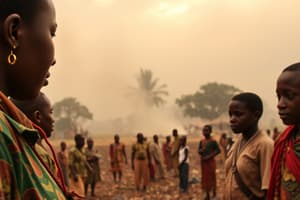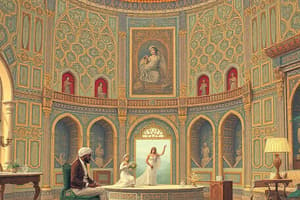Podcast
Questions and Answers
Which continent experienced decolonization in the mid-to-late 1950s to 1975?
Which continent experienced decolonization in the mid-to-late 1950s to 1975?
- Africa (correct)
- Europe
- North America
- Asia
What was a significant period of European imperialism in Africa called?
What was a significant period of European imperialism in Africa called?
- The African Colonization
- The Scramble for Africa (correct)
- The African Liberation
- The African Revolution
Which colonial power had the largest holdings in Africa?
Which colonial power had the largest holdings in Africa?
- Germany
- Britain (correct)
- Spain
- Italy
Which country was the only pre-colonial state in Africa to retain its sovereignty?
Which country was the only pre-colonial state in Africa to retain its sovereignty?
Which rebellion took place in British Kenya during decolonization?
Which rebellion took place in British Kenya during decolonization?
Which country occupied Ethiopia in 1936?
Which country occupied Ethiopia in 1936?
Which country experienced the Zanzibar Revolution during decolonization?
Which country experienced the Zanzibar Revolution during decolonization?
Which event inspired hope in British colonies for self-determination?
Which event inspired hope in British colonies for self-determination?
What was the result of the Atlantic Charter?
What was the result of the Atlantic Charter?
Which colonial power lost its African Empire as a result of World War II?
Which colonial power lost its African Empire as a result of World War II?
What did the United Nations 1960 Declaration state?
What did the United Nations 1960 Declaration state?
What was a major internal cause of decolonization?
What was a major internal cause of decolonization?
What did the United Nations Universal Declaration of Human Rights recognize?
What did the United Nations Universal Declaration of Human Rights recognize?
What did some Britons consider African colonies to be after World War II?
What did some Britons consider African colonies to be after World War II?
Which African leaders came to lead the struggles for African nationalism?
Which African leaders came to lead the struggles for African nationalism?
Which theory suggests that most African economies continued to occupy a subordinate position in the world economy after independence?
Which theory suggests that most African economies continued to occupy a subordinate position in the world economy after independence?
What was the main purpose of the infrastructure built by colonial powers in Africa?
What was the main purpose of the infrastructure built by colonial powers in Africa?
Which economic outcome of colonialism in Africa is disputed?
Which economic outcome of colonialism in Africa is disputed?
What was the impact of colonial language policies on Africa's linguistic diversity?
What was the impact of colonial language policies on Africa's linguistic diversity?
What happened to colonial legislation in African countries after independence?
What happened to colonial legislation in African countries after independence?
What led to the growth of urban communities, industries, and trade unions in Africa during the early 20th century?
What led to the growth of urban communities, industries, and trade unions in Africa during the early 20th century?
Which country became the first sub-Saharan African country to gain independence from European colonisation?
Which country became the first sub-Saharan African country to gain independence from European colonisation?
Who were the two leaders who met in August 1941 to discuss their post-war goals?
Who were the two leaders who met in August 1941 to discuss their post-war goals?
What agreement did Roosevelt and Churchill agree to in their meeting?
What agreement did Roosevelt and Churchill agree to in their meeting?
What did the Atlantic Charter state regarding the form of government for all peoples?
What did the Atlantic Charter state regarding the form of government for all peoples?
What effect did the Atlantic Charter have on African independence?
What effect did the Atlantic Charter have on African independence?
What was the American policy towards Africa characterized by, according to historian James Meriweather?
What was the American policy towards Africa characterized by, according to historian James Meriweather?
Which country became the focus of Kwame Nkrumah's independence movement?
Which country became the focus of Kwame Nkrumah's independence movement?
What event in 1948 became a catalyst for the independence movement in Ghana?
What event in 1948 became a catalyst for the independence movement in Ghana?
What did Nkrumah affirm in the declaration of the 1945 Pan-African Congress?
What did Nkrumah affirm in the declaration of the 1945 Pan-African Congress?
Flashcards are hidden until you start studying
Study Notes
Decolonization and African Independence
- Africa experienced decolonization from the mid-1950s to 1975
- The "Scramble for Africa" was a significant period of European imperialism in Africa
- France had the largest holdings in Africa among colonial powers
Exception to Colonization
- Ethiopia was the only pre-colonial state in Africa to retain its sovereignty
Rebellions and Occupations
- The Mau Mau Rebellion took place in British Kenya during decolonization
- Italy occupied Ethiopia in 1936
- The Zanzibar Revolution occurred during decolonization in Zanzibar
Inspirations for Self-Determination
- The Atlantic Charter inspired hope in British colonies for self-determination
- The Atlantic Charter led to the United Nations 1941 Declaration, stating that all peoples have the right to choose their form of government
Results of the Atlantic Charter
- The Atlantic Charter paved the way for the independence of African countries
- The United Nations 1960 Declaration stated that the subjugation of peoples to foreign domination is contrary to the Charter of the United Nations
Causes of Decolonization
- A major internal cause of decolonization was the recognition of the inherent dignity and equal and inalienable rights of all members of the human family by the United Nations Universal Declaration of Human Rights
- Some Britons considered African colonies to be a financial burden after World War II
African Nationalism
- African leaders such as Kwame Nkrumah came to lead the struggles for African nationalism
- The theory of neocolonialism suggests that most African economies continued to occupy a subordinate position in the world economy after independence
Colonial Legacy
- The main purpose of the infrastructure built by colonial powers in Africa was to facilitate the exploitation of resources
- The economic outcome of colonialism in Africa is disputed
- Colonial language policies led to a loss of linguistic diversity in Africa
- Colonial legislation was repealed in African countries after independence
Urbanization and Industrialization
- The growth of urban communities, industries, and trade unions in Africa during the early 20th century was led by the colonial powers
Ghana's Independence
- Ghana became the first sub-Saharan African country to gain independence from European colonization
- The 1945 Pan-African Congress, affirming the right of African peoples to independence, self-government, and self-determination
Historical Figures and Events
- The meeting between Roosevelt and Churchill in August 1941 discussed their post-war goals
- The American policy towards Africa was characterized by a gradualist approach, according to historian James Meriweather
Studying That Suits You
Use AI to generate personalized quizzes and flashcards to suit your learning preferences.




